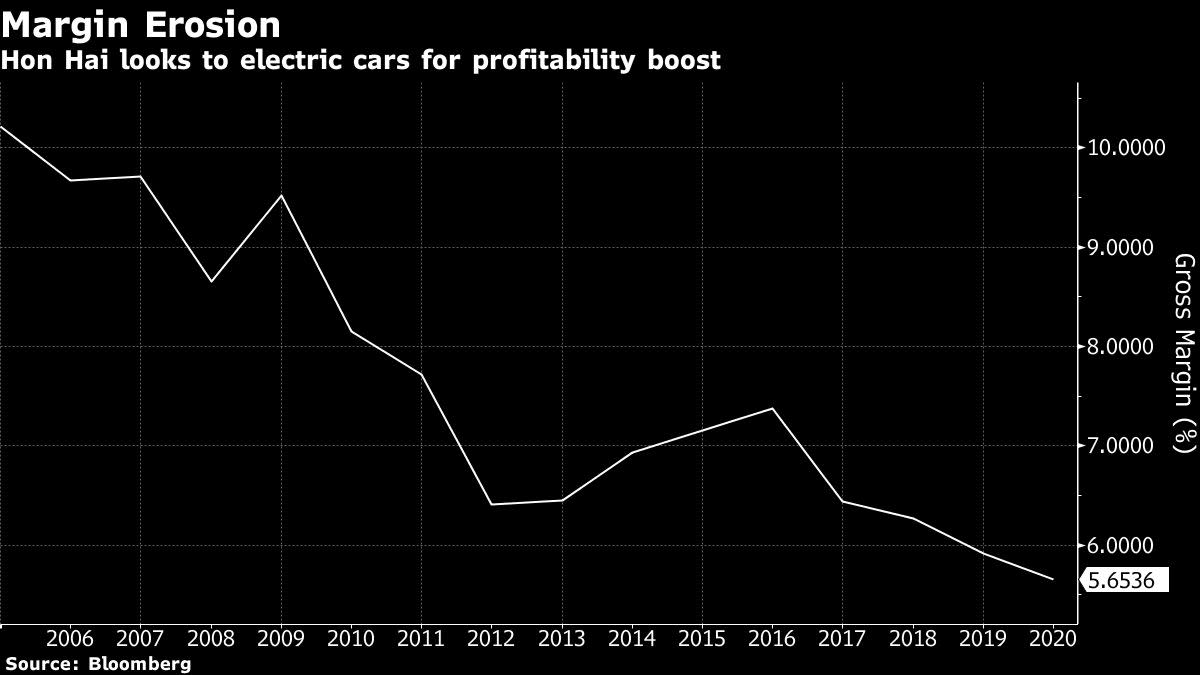Foxconn’s Lordstown Deal Sets the Stage for Apple Car Audition

(Bloomberg) — Foxconn Technology Group’s planned purchase of embattled startup Lordstown Motors Corp.’s auto plant in Ohio may make it a stronger contender to assemble cars for Apple Inc., but success with the endeavor is far from guaranteed.
Most Read from Bloomberg
The Taiwanese company is the largest maker of iPhones, giving it a potential edge as Apple explores the automotive sector. Foxconn agreed to spend $280 million on the Lordstown deal, one of the top vehicle-related investments it has made over the past two years.
Foxconn’s early moves into cars have yielded few tangible results, and Apple is set to require solid proof of vehicle-manufacturing expertise before it settles on a partner — if the iPhone maker decides to make the leap into autos at all. Shares of Foxconn’s flagship unit, Hon Hai Precision Industry Co., fell in Taipei trading on Friday in a sign of investor doubt the plant purchase will be a game changer for the electronics giant.
“It is only logical for Foxconn to explore vehicle manufacturing to stay relevant,” said Steve Man, an automotive analyst at Bloomberg Intelligence in Hong Kong. “If you look at the upstream companies in its value chain, many are dabbling in electric, smart vehicles. Cars are becoming the next mobile devices.”
While Foxconn has inked several electric-vehicle partnerships, its investment in the business has been relatively modest and far behind that by auto giants such as Volkswagen AG or Hyundai Motor Co. Scoring a deal with Apple would vault Foxconn into a major player in the rapidly growing segment, which it targets as a source of growth beyond low-margin electronics.
Apple, which isn’t expected to enter the market for several years but is actively looking into it, would be the ultimate prize for every aspiring EV manufacturer. Working in Foxconn’s favor is its strong relationship with the U.S. consumer-electronics giant. The years-long partnership has expanded as Apple has added product categories, and the company now accounts for about 50% of Foxconn’s annual sales.
Any Apple automobile is still years away and the company has suffered setbacks including the recent departure of the head of its car project to Ford Motor Co. An Apple car has for years been somewhat of a paradox — it’s one of its most hotly anticipated products yet the company has publicly said almost nothing about it.
Read more: Apple Car Chief’s Departure Puts Its Next Big Thing in Doubt
While Lordstown shares jumped 8.4% in the U.S., Hon Hai declined 1.9% in Taipei. The stock has lost about 20% since a recent high in March.
Analysts at CL Securities Taiwan said in a note the plant purchase is cheaper and quicker than building capacity from scratch, which “should help alleviate some investors’ concerns on the visibility for EV earnings contribution.”
Foxconn has yet to commercially release any vehicle following the debut of its EV platform last year. It plans to start mass production of Lordstown’s Endurance electric pickup in Ohio in April, according to a person familiar with its schedule.
In comparison, carmakers such as Tesla Inc., Volkswagen and Hyundai are already churning out EV models and spending billions of dollars on product development and capacity. Ford and South Korea’s SK Innovation Co. said this week they plan to invest $11.4 billion in constructing three battery factories and an assembly plant for electric F-Series pickup trucks in Tennessee and Kentucky, the biggest investment in the U.S. automaker’s history.
Still, Foxconn has made some progress. It inked a manufacturing deal with Fisker Inc. and formed a partnership with Thailand’s state-owned conglomerate PTT Pcl. It’s also struck pacts with Stellantis NV and Zhejiang Geely Holding. One of the vehicles Foxconn will build at the Lordstown plant is Fisker’s Project Pear, which stands for Personal Electric Automotive Revolution.
The Lordstown deal “reflects Foxconn’s flexibility in providing design and production services for different EV customers,” Hon Hai Chairman Young Liu said in a statement on Friday.
Most Read from Bloomberg Businessweek
©2021 Bloomberg L.P.




